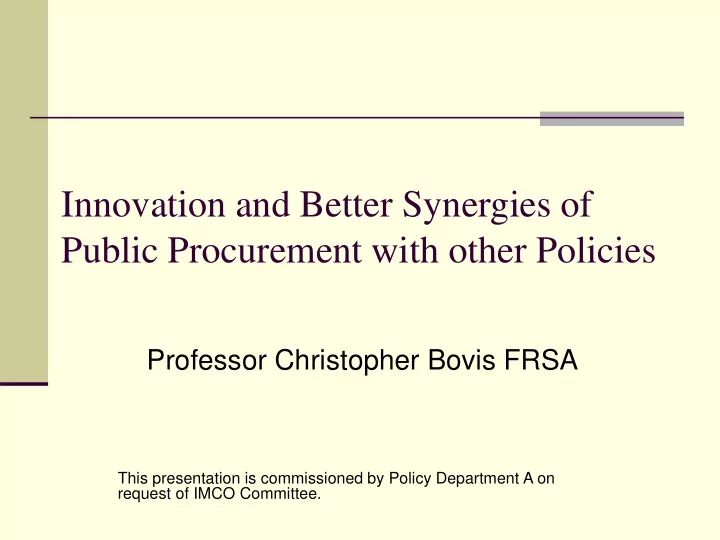

Innovation and Better Synergies of Public Procurement with other Policies Professor Christopher Bovis FRSA This presentation is commissioned by Policy Department A on request of IMCO Committee.
EU Public Procurement Framework Utilities Public Sector Concessions Directive Directive Directive 2014/25/EU 2014/24/EU 2014/23/EU Defence Directive 2009/81/EC
The Traction of EU Public Procurement Law Contracting Material Public Contracts Authorities / Coverage Entities Advertisement and Publicity Contract Specifications Selection & Qualification Award procedures Award criteria
Objectives of the 2014 EU Procurement Reforms Simplicity (codification, modernisation and exhaustive harmonisation) Strategic (EU 2020 Growth Strategy, ESFI) Access for SMEs (dimensional / sub-dimensional) Flexibility (Innovation, Green, Sustainable, Socio-economic, SGEI) Governance (probity, professionalisation of procurers)
Strategic Procurement Available tools Pre Procurement Engagement Market consultation and pre-commercial procurement Joint and cross-border procurement Division into lots / disaggregation Selection and Qualification Financial and economic standing Technical specifications, functional and performance- based specifications
Award procedures Competitive dialogue, negotiations, frameworks, Innovation Partnership Award criteria BPQR and MEAT for environmental and social criteria and innovative characteristics LCC Post procurement Engagement Contract Performance Social and environmental considerations
Barriers and Obstacles to Strategic Public Procurement Specifications Standards (efficacy of CPV) Qualification Economic standing of SMEs (risk ratio) Award criteria Cost based criteria (lowest price) MEAT and now BPQR LCC (methodology)
The 2017 Soft Law Package Communication on Making Public Procurement work in and for Europe The priorities for action Communication on voluntary ex-ante assessment of the procurement aspects for large infrastructure projects Compliance Resolution on Professionalisation of Public Procurement Previous Guidance Strategic use of public procurement in promoting green, social and innovation policies (2015) Supporting social responsibility in the economy through public procurement (2016) Europe 2020, A strategy for smart, sustainable and inclusive growth , (2010)
Critical assessment of EU procurement implementation initiatives Increase of strategic public procurement - Voluntary ex-ante assessment mechanism for large infrastructure projects; - Updated guidance on green and social procurement and innovation procurement - Cooperative and joint cross-border public procurement, including innovation by large buyers - Exchange good practices regarding strategic procurement, including key sectors (construction, healthcare, IT) Procurer Professionalisation - European competence framework for public procurement with the essential skills and competences - Network of National Innovation Procurement Centres
SME access to procurement markets - align third-country legal practice with EU acquis - access to justice for SME disputes in public procurement Digital transformation of procurement - Extend the scope of the e-Certis - European Single Procurement Document - e-Invoicing
Soft Law - Discretion Harmonisation vs uniformity Exhaustiveness - coverage Tractability – externalisation Competition – decoupling in contestable markets Rule of reason Flexibility Contracting Authorities – in house, affiliation, public partnerships Award criteria – BPQR / MEAT, LCC Selection & Qualification – capacity, standing, exclusions Procedural autonomy – Remedies
Drivers of Discretion Policy Ordo approach = horizontal policies environment, employment, SMES, industrial Preference priority, protection
Boundaries of Discretion Legal Principles EU Public EU Treaties Procurement Directives Transparency Free Movement of goods Accountability Right of establishment Objectivity Right to provide services Non-discrimination Equal treatment
Standards = equivalence Materiality – contractual relevance Primacy – via direct effect towards uniformity Judicial activism – porosity cured Doctrinal interpretation = rule of reason – Effectiveness, Functionality, Objectivity, Procedural equality Regulatory standardisation - convergence
Price vs cost – conceptual foundation of strategic procurement Soft Law crucial in assisting effectiveness of acquis To buy or not to buy Professor Christopher Bovis FRSA University of Hull c.bovis@hull.ac.uk
Recommend
More recommend